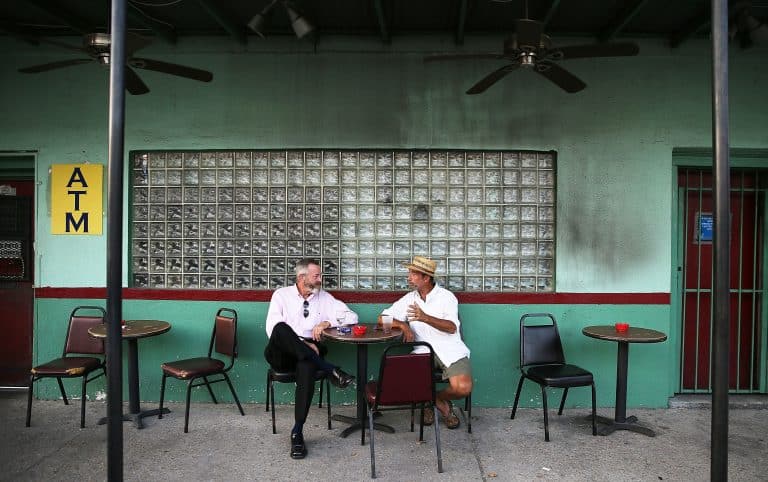
Image by Mario Tama/Getty Images, © All Rights Reserved.
For Longevity, Men Need To Cultivate Deep Friendships
One of my most distinct memories from growing up is sitting at the top of the stairs in my jammies, studying the sounds of women talking in a group. I could almost compose it for you now, like a symphony — first the one voice, saying something I couldn’t quite hear, then the explosion of a chorus of laughter that would slowly die down and then more indecipherable singular voices, and on and on like that for hours.
My mom had book groups and dream groups and journaling groups and film festival committee meetings and they all involved a small army of women showing up at our home after bedtime, ceramic bowls filled with homemade dips and wine bottles and ear-marked books tucked under their arms. It was a secret world in many ways. I really couldn’t make out what they were saying, but the sonic rhythms of it revealed the moral: gather women and joy sparks.
I knew, from watching my mom, that women friends had awesome, infectious chemistry with one another. My dad’s friendships, on the other hand, were completely invisible to me. I knew he had some close friends at work, but I almost never saw these suited men. I knew my mom and he went out with other couples for dinner, but it didn’t appear that my dad had any particularly passionate connection to any of the men in those couples. If anything, it appeared that the women were close and then men were sort of happy to hang out.
I was reminded of this recently while in conversation with Dr. Laura Cartensen, a psychology professor at Stanford and the author of A Long Bright Future: Happiness, Health, and Financial Security in an Age of Increased Longevity. She mentioned a statistic that I had heard before but not paid enough attention to: men are a third more likely to die shortly after losing their wives, while women have no increased chance of dying after losing their husbands.
Dr. Cartensen is the founding director of the Stanford Center on Longevity, which runs something called the “Sightlines Project” — a treasure trove of quality of life data that you can slice and dice by generation, income level, gender, etc. When it comes to sociality — having close friends, interacting with neighbors, attending a religious institution — men score lower across the board.
I’ve written about this before, but I feel the need to write about it again because I think there’s something so profound underlying these statistics. We know that a high quality of life in older age is largely determined by the quality of relationships that one enjoys. Men, on average, die five years younger than women, and researchers believe that a big part of that gap is about social isolation. In other words, men are dying, to some extent, because they undervalue friendship.
What I was hearing as a little girl, perched on that top stair, wasn’t just women having fun. It was women strengthening their bonds and, in so doing, their health, women weaving real, lifelong relationships out of strands of storytelling, self-reflection, knowledge-sharing, work, activism, tears, and laughter. Three decades later, my mom still gathers with many of these women. I now gather with my own little coven of beautiful geniuses. I live into this gift from my mother with such gratitude; it may just be one of her most profound legacies.
And yet, I worry about my father, my brother, my husband, my guy friends. How can they defy these statistics and be men who gather? How can they invest in the bonds they’ll need to live long, healthy lives? How can they build friendships that feed their myriad needs so that we, their wives (for those in a heterosexual context), aren’t heavy with the burden of it all?
I think about the pair of men who I can reliably find sitting on the bench outside of my favorite donut shop almost every single morning. They smoke, which can’t be good for their long-term health prospects, but they’re together, so perhaps the nicotine is tempered somewhat by the chuckles.
I think about the gaggle of old guys that seem to congregate at all hours outside of the Ethiopian coffee shop nearby. They’re not just shooting the shit; they’re investing in their futures.
And I think about two of the sweetest old besties I know — Parker and his best friend Tom — who can still crack one another up as if a day hasn’t passed since they were college chums. Seeing them together is as tender as it is reassuring.
There is something tragically beautiful, of course, about the fact that men can die of a broken heart. Surely it’s a sign that they’ve invested in the women they love. And yet, how much more of a tribute to their wives would it be if, instead of dying like them, they made friends like them? That’s what I would want for my man.


Share your reflection